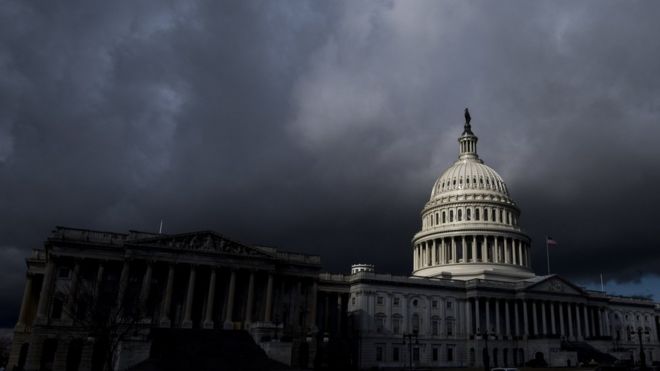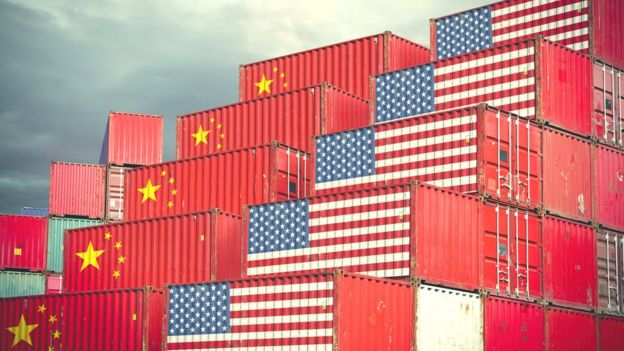 BILL CLARK/GETTY IMAGES
BILL CLARK/GETTY IMAGES
The World Bank is warning of increasing risks, or what it calls "darkening skies", for the world economy.
In its annual assessment of global prospects the Bank predicts continued, though somewhat slower, growth this year and next.
The Bank's forecast for the global economy is expansion this year of 2.9% and 2.8% in 2020.
But overhanging the broadly favourable outlook are rising concerns that could mean economic performance falls short.
There is certainly some good news in this report. While the global economy is slowing down it's likely to be what the Bank's economists call a "soft landing". The slowdown started in the middle of last year and it has so far been "orderly".
The predicted slowdown is focused on the rich countries, particularly the US, although it will continue to expand more rapidly than either the Eurozone or Japan according to the Bank's forecasts.
The US slowdown is the result of the fading impact of President Trump's tax cuts and by 2021 its growth will have almost halved - to 1.6% compared with 2.9% last year.
Change of gear
On the other hand, growth in emerging markets and developing economies is likely to gather pace somewhat despite the continued cooling down in China - a process which began at the start of the decade.
By 2021 growth in China is expected to be 6%, which is still pretty strong, but it is a marked change of gear for an economy that expanded by an average of 10% annually between 1980 and 2010.
Franziska Ohnsorge, a World Bank economist and lead author of the report said in a BBC interview: "In China it's policy engineered, a very deliberate slowdown towards more stable long term growth."
That is what the Bank thinks is the likely performance of the world economy over the next few years. But there are risks that could mean that it doesn't work out so well.
That is reflected in the title of this year's report: "Darkening Skies".
Some of the clouds are familiar ones.
International commerce is already weakening, and conflict over trade especially between the US and China is one of the major risks.
These are the two largest national economies on the planet. The Bank has calculated that 2.5% of global trade is affected by the new tariffs - trade taxes - that were imposed last year, and it would be double that if the further tariffs that have been discussed were implemented.
 GETTY IMAGES
GETTY IMAGES
The risk of rising protection remains high, the report says. It could depress economic activity in these two giant economies. Slower growth in China is particularly an issue for developing countries that export industrial commodities, energy and metals, as China is such a big buyer of these products.
Franziska Ohnsorge says between them the US and China account for 20% of global trade and 40% of global GDP. If their economies are both hit she says, "it's something that's felt all around [the world]".
The Bank does not expect a recession in either of these economies, though some commentators are now suggesting the US could be heading for one next year. But if it were to happen the risk of a global recession would increase sharply. In the past, the report says, the risk of a global recession in any one year was 7%. But if the US has a downturn, the probability goes up to 50%.
Brexit risk
Financial markets are also a risk. The chances of disorderly developments have increased. If interest rates are increased again in the US, or if the dollar gains sharply, it could have an impact on emerging and developing economies.
Brexit appears in the Bank's assessment as a possible risk for countries that are especially reliant on selling to Europe. If the UK's exit takes place with no agreement there is a chance of significant economic damage to both the UK and the EU which could then affect countries in Eastern Europe and North Africa which are closely integrated with Europe.
And even in the Bank's central, relatively optimistic, picture there are some depressing prospects for parts of the developing world - which is the group the World Bank exists to help.
For about a third of countries concerned growth in per capita terms won't be enough to restart what the report calls "the catch-up" with the developed world, the narrowing of the gap between living standards.
And in Sub-Saharan Africa per capita growth is likely to be less than 1%, insufficient to drive significant progress in alleviating poverty.
No comments:
Post a Comment